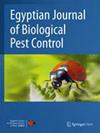哈茨木霉、枯草芽孢杆菌和曲霉在苗圃防治苹果幼苗衰霉的效果及促生效果评价
IF 2.1
3区 农林科学
Q1 ENTOMOLOGY
引用次数: 0
摘要
摘要背景苹果萎蔫病是苗圃中造成幼苗根腐病和领腐病的重要病害。采用体外和体内温室试验,评价了不同真菌和细菌拮抗剂对该病的防治效果。结果10株曲霉和10株哈茨木霉的体外培养试验均显示出抑制病原菌径向生长的效果。其中,黑曲霉A10、假丝酵母菌A5、哈兹托菌Tr9和Tr10的抑菌率最高,均超过50%。4种最有效的拮抗剂与枯草芽孢杆菌(B)的体内试验表明,A5和A10两种曲霉菌株联合使用效果最好,根褐变指数降低55.55%。结果表明,除哈兹霉(Tr10)与枯草芽孢杆菌(B)联合处理外,所有拮抗剂及其组合对接种植株的卫生状态指标均有显著影响。哈兹霉(Tr10)和枯草芽孢杆菌(B)处理对接种植株的高度分别提高了173.19%和191.3%。在拮抗剂对苹果幼苗根重的影响方面,只有黑曲霉(A10)处理能显著提高根重363.17%。结论黑曲霉A10、假丝霉A5、哈兹霉Tr9和Tr10对黑曲霉体外生长的抑制作用最大。黑曲霉A10与假丝霉A5联合使用在体内治疗中降低疾病严重程度指数最有效。而哈兹芽孢杆菌(T. harzianum, Tr10)、枯草芽孢杆菌(B)和黑芽孢杆菌(A. niger, A10)对苹果幼苗生长有促进作用。本文章由计算机程序翻译,如有差异,请以英文原文为准。
Evaluation of Trichoderma harzianum, Bacillus subtilis and Aspergillus species efficacy in controlling Pythium ultimum associated with apple seedlings decline in nurseries and their growth promotion effect
Abstract Background Apple decline diseases, responsible for seedlings root and collar rot in nurseries, are an important disease. Different fungal and bacterial antagonists were evaluated to control Pythium ultimum associated with this serious disease using in vitro and in vivo greenhouse assays. Results The in vitro test of ten Aspergillus spp. and ten Trichoderma harzianum isolates showed their efficacy to reduce the radial growth of P. ultimum . The isolates, A. niger A10, A. candidus A5, T. harzianum Tr9 and Tr10, were the most effective with a high inhibition percent that exceeded 50%. The in vivo test of the four most effective antagonists and a strain of Bacillus subtilis (B) showed that the combination of the two Aspergillus isolates (A5 and A10) gave the best result with a decrease in root browning index by 55.55%. Results showed also the efficacy of all tested antagonists and their combinations on the sanitary state index of the inoculated plants except the combination between T. harzianum (Tr10) and B. subtilis (B). The two treatments, T. harzianum (Tr10) and B. subtilis (B), significantly improved the height of inoculated plants by 173.19 and 191.3%, respectively. Regarding the efficacy of antagonists on apple seedlings root weight, A. niger (A10) was the only treatment that significantly increased this parameter by 363.17%. Conclusions A. niger A10, A. candidus A5, T. harzianum Tr9 and Tr10 exhibited the highest value of in vitro inhibition to growth of P. ultimum . The combination of A. niger A10 and A. candidus A5 was the most effective in vivo treatment in reducing the disease severity index. However, T. harzianum (Tr10), B. subtilis (B) and A. niger (A10) revealed to be able to stimulate the apple seedlings growth.
求助全文
通过发布文献求助,成功后即可免费获取论文全文。
去求助
来源期刊
CiteScore
4.90
自引率
16.70%
发文量
128
审稿时长
>12 weeks
期刊介绍:
The Egyptian Journal of Biological Pest Control is a periodic scientific journal published by the Egyptian Society for Biological Control of Pests (ESBCP) in collaboration with SpringerNature. The journal aims to publish internationally peer-reviewed, high-quality research articles in the field of biological and integrated pest control (non-chemical control). The journal publishes review articles, original papers, conference reports, book reviews, editorials, laboratory reports, technical notes and short communications.

 求助内容:
求助内容: 应助结果提醒方式:
应助结果提醒方式:


